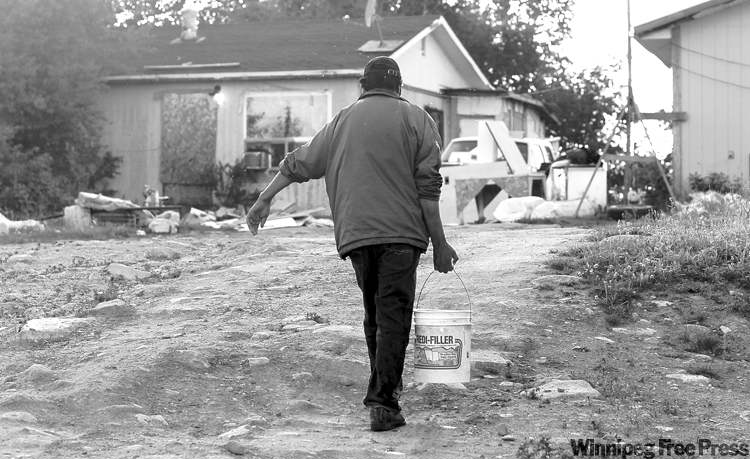Ottawa pledges funding to Island Lake
Bringing running water to Manitoba's northern First Nations
Advertisement
Read this article for free:
or
Already have an account? Log in here »
To continue reading, please subscribe:
Monthly Digital Subscription
$0 for the first 4 weeks*
- Enjoy unlimited reading on winnipegfreepress.com
- Read the E-Edition, our digital replica newspaper
- Access News Break, our award-winning app
- Play interactive puzzles
*No charge for 4 weeks then price increases to the regular rate of $19.00 plus GST every four weeks. Offer available to new and qualified returning subscribers only. Cancel any time.
Monthly Digital Subscription
$4.75/week*
- Enjoy unlimited reading on winnipegfreepress.com
- Read the E-Edition, our digital replica newspaper
- Access News Break, our award-winning app
- Play interactive puzzles
*Billed as $19 plus GST every four weeks. Cancel any time.
To continue reading, please subscribe:
Add Free Press access to your Brandon Sun subscription for only an additional
$1 for the first 4 weeks*
*Your next subscription payment will increase by $1.00 and you will be charged $16.99 plus GST for four weeks. After four weeks, your payment will increase to $23.99 plus GST every four weeks.
Read unlimited articles for free today:
or
Already have an account? Log in here »
Hey there, time traveller!
This article was published 16/12/2011 (5110 days ago), so information in it may no longer be current.
OTTAWA — One hundred homes in Island Lake will get indoor taps and toilets in 2012 as part of a new federal commitment to the remote Manitoba region.
The retrofits are part of the first instalment of $5.5 million promised by Aboriginal Affairs Minister John Duncan toward ensuring everyone in the four reserves that make up Island Lake gets access to clean, running water.
The funding will also be used to buy four new water trucks, five new sewage trucks and materials to build garages to store them.

More than half the homes in the four communities — Garden Hill, St. Theresa Point, Wasagamack and Red Sucker Lake — have no indoor plumbing. It means several thousand people rely on water toted in pails from community water pipes and local lakes, sometimes walking several kilometres with buckets.
Many people have less access to clean water each day than is recommended by the United Nations. It leads to serious public-health problems, including chronic diarrhea from drinking untreated water, skin ailments from not having enough water to bathe in and the spread of disease because people can’t even wash their hands with soap and water.
The issue came to a head during the H1N1 outbreak in 2009, which hit Island Lake communities harder than almost anywhere else in Canada. Earlier this week, a Public Health Agency of Canada report on the outbreak in St. Theresa Point was finally released publicly. It found 175 confirmed or suspected cases of H1N1 on the reserve and blamed the poor hygiene caused by the lack of running water as one of the culprits. The handle on the community water tap was also cited as a possible source for the outbreak.
The first retrofits will only solve the problem for about one-tenth of the homes that need work, said Manitoba Aboriginal Affairs Minister Eric Robinson. Robinson will be in Ottawa today, meeting with Duncan to discuss a provincial-federal partnership to retrofit the rest of the homes.
“It’s quite similar to what is going in Attawapiskat,” said Robinson.
The community in northern Ontario has been making headlines for several weeks because of a housing shortage that had forced dozens of residents into unheated tents, sheds and abandoned construction trailers. Ottawa has ordered a review of the band’s finances, as well as authorizing funding for modular homes and emergency supplies.
The Red Cross also sought donations and is shipping supplies such as blankets, warm clothing and heaters to the community.
Federal Liberal aboriginal affairs critic Carolyn Bennett said this week she fears the government will do what it can to stop the crisis in Attawapiskat to get the story off the front pages, but other communities in a similar boat will be left behind.
Bennett, who has been to the Island Lake region twice and has seen for herself the struggles of living without access to enough clean, running water, said no one in Canada should accept that any Canadian lives in such conditions.
“Mr. Speaker, there are 99 other Attawapiskats,” she said during question period this week. “In Fort Albany, Wasagamack and Natuashish, severe over-crowding, toxic mould and no water are the acceptable norm.”
In mid-November, Duncan agreed to support a Liberal motion calling for the government to bring about a concrete plan to get running water into all the homes on northern reserves currently without it, and to begin acting on it by spring 2012.
At the same time, he pledged an immediate commitment of $5.5 million to get things rolling in Island Lake next year.
“We are all in agreement the current situation is not acceptable,” Duncan said Nov. 18.
The four reserves in Island Lake are only accessible by air and briefly in the winter on ice roads.
If materials are not trucked up on the winter roads, they lose an entire year of construction time because it is cost-prohibitive to get supplies up by airplane.
Three of the four reserves have endorsed a provincial plan to jointly fund retrofits to all the homes.
In addition to building water pipes to all the homes where it is feasible, there is a need for water holding tanks, bathtubs, toilets and sinks.
mia.rabson@freepress.mb.ca


